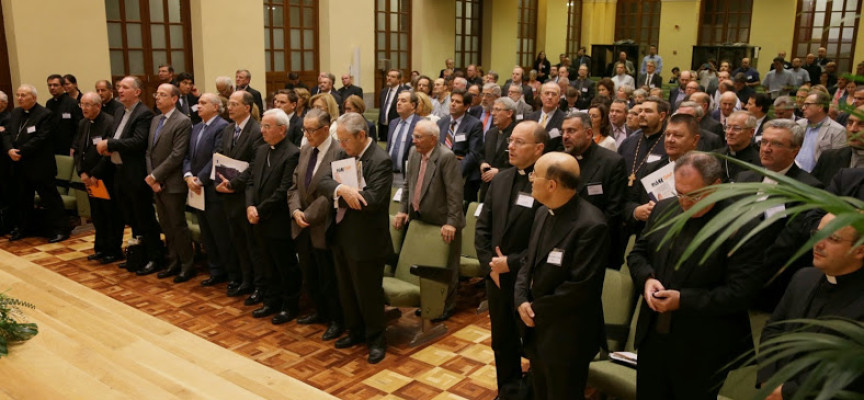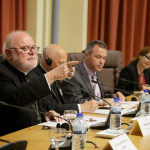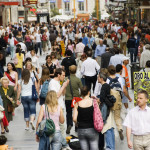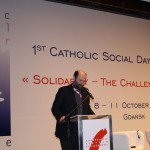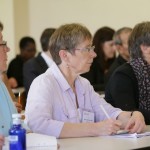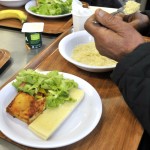(Madrid) – “The Church loves Europe and takes on its commitment for Europe”. This is the starting point to report about the Catholic Social Days for Europe in Madrid because, despite the different positions, the pro-Europe choice of the Church is out of the question – today even more than yesterday. And it is no small thing in a time of anti-European pressure and open challenges.
Card. Reinhard Marx, president of COMECE (Commission of the Catholic Bishops’ Conferences at the European Community), when he addressed the 180 participants from 29 countries, listed some of these challenges: youth unemployment, social and economic crisis, ‘demographic winter’, and migration. Not to mention the issue of peace because of a conflict that, 100 years after the outbreak of the First World War, has affected the heart of the continent.
These challenges add up to a deeper question: what kind of democracy for Europe in the future?
How to avoid that pluralism becomes relativism, that the need for governance leads to forms of bureaucratic authoritarianism, or that the European social model is sacrificed on the altar of economic crisis?
In short, how about what could we build, the “new narrative” for Europe which has been mentioned by the President of the EU Commission, Mr. Barroso, as if matching – as Card. Marx said – a “new narrative” of the Church in Europe?
These important questions were not given any answer by the assembly of Madrid, which only offered some useful methodological indications.
First of all, Europe should get rid of its self-referential approach, thus restoring its specific role in the world. The choice of integration, in fact, cannot become a shortcut to increase its importance in the globalized world, but it should stem from a clear-cut and shared political will that needs to be constantly renewed and nourished. Only then, in the words of Jean Monet, Europe will be a “contribution to a better world”.
This is possible only if Christian citizens in Europe will be united, and if they will be successful in building a truly European “civil society”, according to the wish of the assembly of Madrid. A network that promotes, at continental level, a treasure of realities that enriches the cultural, political, and economic life of each country.
Such a network will be all the more effective to the extent that it is open to all Christian denominations: a perspective which is encouraged by the presence of representatives of various Christian Churches in the Catholic Social Days.
The hubs of this network already exist and are active. In the words of Card. Bagnasco, vice president of CCEE, in these times of material and spiritual crisis, many doors are being opened not so much to the needs, but to the people in need: universities, associations, and cultural centres.
The path that the Church in Europe should follow, and this is clear since long ago, is this: to put together the many people working on the ground with those who – in universities and in schools – have the capability to provide the reading keys to interpret this reality. Not forgetting those who – at the political level – have the responsibility to direct Europe.
We are aware that none of these plans may be enough by itself, and that the social doctrine of the Church – which remains anunescapable point of reference – needs to be embodied if we are to face the challenges of our times.
Only in this way the Church will be able to inhabit today’s Europe, by dirtying her own hands and feet, and by combining the defence of values with the defence of people.
This is how Pope Francis summarizes all this in his message to the Catholic Social Days, signed by the Secretary of State, Mgr. Parolin. He prays especially that “this event will highlight the ways in which faith compels us to transmit the Church’s love for the poor, for those suffering persecution, for all who are forced to flee their homes and for those who come to Europe in search of refuge. A Church that gives greater attention to the material needs of those who suffer will also learn how to provide a more convincing proclamation of truth and salvation to those who hunger and thirst for eternal life and to those who ‘call you to account for the hope that is in you’”.
(Madrid) – “La Chiesa ama l’Europa e per l’Europa si impegna”. È questo l’assunto da cui partire per raccontare le Giornate sociali europee di Madrid perché, pur nella diversità di posizioni, la scelta pro-Europa della Chiesa è fuori discussione: oggi ancor più di ieri. E non è poco in un tempo di pressioni antieuropeiste e di sfide aperte.
Il card. Reinhard Marx, presidente della COMECE (la Commissione delle Conferenze episcopali presso la Comunità Europea), parlando ai 180 partecipanti, provenienti da 29 Paesi, ha provato ad elencare alcune di queste sfide: disoccupazione giovanile, crisi economico sociale, inverno demografico, migrazioni. Senza dimenticare il tema della pace con un conflitto che, a 100 anni dalla scoppio della Prima guerra mondiale, è tornato nel cuore del continente.
Sfide a cui si affianca una domanda più profonda: quale democrazia per l’Europa del futuro?
Come evitare cioè che il pluralismo diventi relativismo, che l’esigenza di governabilità porti a forme di autoritarismo burocratico o che il modello sociale europeo venga sacrificato sull’altare della crisi economica?
Attorno a cosa costruire, insomma, quella “nuova narrativa” per l’Europa evocata dal presidente della Commissione Barroso, a cui il card. Marx ha detto dovrà corrispondere una “nuova narrativa” della Chiesa in Europa?
Domande importanti alle quali l’assemblea di Madrid non ha offerto risposte, bensì qualche utile indicazione di metodo.
A partire dalla necessità di liberare l’Europa dall’autoreferenzialità, restituendole un ruolo nel mondo: perché la scelta dell’integrazione non può essere una scorciatoia per contare di più nel mondo globale, ma deve nascere da una volontà politica precisa e condivisa che ha bisogno di essere costantemente rinnovata e alimentata. Solo così, usando le parole di Jean Monet, l’Europa potrà essere un “contributo a un mondo migliore”.
Questo sarà possibile solo se i cristiani d’Europa sapranno essere uniti arrivando a costruire quella “società civile” realmente europea auspicata a Madrid. Una rete che riproponga, sul piano continentale, quella ricchezza di realtà che arricchisce la vita culturale, politica ed economica dei singoli Paesi.
Una rete che sarà tanto più efficace quanto più saprà aprirsi a tutte le confessioni cristiane: una prospettiva incoraggiata dalla presenza alle Giornate sociali di rappresentanti di diverse Chiese cristiane.
I punti di questa rete esistono già e sono vivi: sono quelle porte che, ha ricordato il card. Bagnasco, vicepresidente della CCEE, in tempo di crisi – materiale e spirituale – si stanno aprendo non tanto ai bisogni, quando alle persone bisognose. Sono le università, le associazioni e i centri culturali.
Il percorso che attende la Chiesa in Europa, non da oggi, sembra dunque questo: riuscire a unire le tante persone che lavorano sul territorio a quanti a livello accademico e magisteriale possono offrire le chiavi di lettura per leggere quella stessa realtà. E da qui a quanti a livello politico hanno la responsabilità di guidare l’Europa.
Con la consapevolezza di come nessuno di questi piani possa bastare da solo e di come la dottrina sociale della Chiesa – che resta un punto di riferimento imprescindibile – abbia bisogno di essere calata nelle sfide dell’uomo di oggi.
Solo così avremo una Chiesa che saprà abitare l’Europa di oggi, sporcandosi mani e piedi, unendo la difesa dei valori alla difesa delle persone.
Una sintesi che Papa Francesco affida al messaggio per le Giornate sociali: “Egli – si legge nel testo firmato dal Segretario di Stato Parolin – prega soprattutto affinché questo evento metta in evidenza i modi in cui la fede ci porti a trasmettere l’amore della Chiesa per i poveri, per quelli che subiscono persecuzioni, per tutti coloro che sono costretti a fuggire dalle loro case e per coloro che vengono in Europa in cerca di rifugio. Una Chiesa che presta maggiore attenzione ai bisogni materiali di coloro che soffrono imparerà anche a offrire un annuncio più convincente di verità e di salvezza a coloro che hanno fame e sete di vita eterna e a coloro che ‘vi domandano ragione della speranza che è in voi’”.
Michele Luppi
www.africaeuropa.it
Latest posts by Michele Luppi (see all)
- How can Europe do that? - 16 aprile 2016
- A raw nerve in european consciousness - 23 luglio 2015
- The cry of the dead of Garissa - 18 aprile 2015

